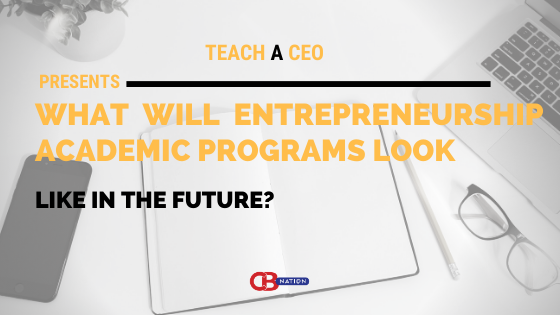The landscape of entrepreneurship programs is rapidly changing and giving special emphasis to hands-on experience. Obtaining an academic program is important in validating your business concept but many will argue that is no longer the case. The future of entrepreneurship academic programs remains dynamic and there's need for aspiring entrepreneurs to adapt to the changing environment.
Here what entrepreneurship academic programs will look like in the future according to entrepreneurs and business owners.
#1- With actionable learning

The future of entrepreneurship academic programs has been evolving exponentially over the last few years with access to a plethora of low cost and no-cost training online. Entrepreneurs are moving faster than ever, and they want practical advice and training from people who have been there. Going to a 4-year university is not how the modern entrepreneur educates themselves today. They want actionable learning that they can use on the job.
Thanks to Reb Risty, REBL Marketing!
#2- Focused on a number of things

If I were to recommend focuses for future entrepreneurship programs I think I would focus less time on creating elaborate business plans and presentations and more on practical skills you will use on a day-to-day basis. Things like pitching your services successfully to others, how to make the most of networking opportunities, managing clients/customers and having a strong understanding of the basics like accounting, managing contracts, and basic marketing and design skills. Small business owners need to be scrappy and are often managing many facets of their businesses by themselves (especially at the beginning) so it's important to have basic understandings of each of those things. Another aspect that I think is really important is self-development courses. Your mindset, confidence and drive are essential in finding success as an entrepreneur but they are rarely integrated into formal education programs.
Thanks to Anna Osgoodby, Bold & Pop!
#3- Corporations and businesses will take over

I believe corporations and businesses will be the ones educating this specific crowd. In both terms of both entrepreneurship and intrapreneurship. The college system has failed to adapt quickly, what might have taken 18 months to change and adapt to advances in the field can be done by a business within 2-3 months. Mostly because they're the ones in the field either making the changes or witnessing it. Not only will the student be able to learn from someone who is currently in the field but will also be able to acquire real-life experience at a much quicker rate.
Thanks to Juan Marin, IBR Group Corp!
#4- Centered on media entrepreneurship

I believe that in the future entrepreneurship academic programs will center on media entrepreneurship: telling stories, entertaining, growing audiences, and educating or sharing a message. Students may be asked to create podcasts, blogs, YouTube series, live stream channels, newsletters, or video series and to hustle to grow an audience for that content. With little capital to go around after this covid recession, storytelling is an accessible form of entrepreneurship for any student. It's also something that humans do well in comparison to machines or automation, meaning it won't go away as machine learning and AI replace more tedious responsibilities. Also, digital media tools are becoming more accessible as startups like Canva and Kapwing make publishing software more accessible. Combined with the proliferation of sharing platforms, digital media is this decade's frontier of entrepreneurship and will be the center of academic programs.
Thanks to Julia Enthoven, Kapwing!
#5- Focused on two aspects

In the future, academic programming on Entrepreneurship will have to stress a bit more on the virtual and digital aspects of client outreach, conversion, and retention. Being that a lot more of a business' clients will have to be found online, converted online, and retained online, business owners should make the shift to ensure they're able to meet these demands. Another aspect that will have to be stressed in academic programs, is that customers will have to come to the realization that things will be held/sold/promoted online or on some sort of digital platform.
Thanks to Chike Uzoka
#6- It will be about developing creativity and innovation

As time goes by, more people are more intrigued in business that they also wish they can start their own. Especially now in our situation, wherein having a business is so easy and you can start right at your doorstep. In line with this, we can also expect that more and more students will pursue a business major to be an entrepreneur. Entrepreneurship programs in the future will be more about developing creativity and innovation. Since technology is fast-changing, the world needs people who can maximize every resource given. We need innovative people that will give us a great idea from a scrap that will make our lives way easier.
Thanks to Kas Andz, Kas Andz Marketing Group!
#7- Focused on creating real opportunities

It has always struck me as somewhat antithetical to aspire to have a degree in entrepreneurship. By its very nature one might expect that this is best learnt, on-the-job. That said, entrepreneurship has been offered widely in the past – but one has to wonder who the target audience has really been. Often they are people in corporations who have been tasked with developing a more entrepreneurial spirit. In this case, studying this topic at a business school and earning an additional degree or diploma adds credibility, but does it increase one’s real ability to become an entrepreneur? I don’t believe so. Enter a new era – where real people wanting to create real opportunities will seek out the skills to do so. These people have neither the time nor the financial resources to pursue long academic degrees, that (let’s face it) provide a theoretical appreciation at best. They will turn to largely free, highly accessible sources of content that have been created and curated by practitioners. As the halls of Harvard remain empty next year, the clicks to edX, Udemy and LinkedIn learning steadily increase.
Thanks to Angy Watson, Tutuka!
#8- Focused on flexible learning

As someone who built a leading undergraduate entrepreneurship program at a major university, and now teaches in the same program, I assert that entrepreneurship programs in higher education wrestle with a fundamental question: Is the goal to turn students into entrepreneurs or to get them to think like entrepreneurs? Either approach can be justified, but I think the role of a large public institution is to serve all students. Thus the mission of entrepreneurship education should be to develop professional and life skills for any motivated student. The goal is to teach them the traits of being entrepreneurial-how to be resilient, persistent, resourceful, make decisions with high degrees of uncertainty, manage risk, think innovatively, and so forth. Regardless of professional ambition, developing these skills will benefit all students-even those attracted to non-profits or public service. Almost all universities have programs like this, and in the future, more and more of the instruction and collaboration will, out of necessity, need to happen online and virtually. For the much smaller set of students whose ambition is to start a company, there will be focused programs to assist them.
Thanks to Neil Kane, Burgess Institute for Entrepreneurship & Innovation!
#9- Will require stronger entrepreneurs to face adversities

As a finance expert, I believe entrepreneurship academic programs should be revisited more often as the times are fast changing. Since the pandemic, more people have thought of starting their own small businesses to survive. The mindset and situation have drastically changed. For me, future entrepreneurs should be stronger to face adversities and setbacks. More often than not, what you learned may not always work as well as you imagined it to be. They should also be mindful of how to assess a situation and how to get past through it. They have to be more independent as most, if not all decisions, will be coming from them.
Thanks to Timo Wilson, Asap Credit Solutions!
#10- Skills-based
Entrepreneurship education will move rapidly beyond the mechanics of starting a business, to prepare students across disciplines to attack problems the way entrepreneurs do. Students will learn by doing as they evaluate broken and obsolete systems throughout the economy and society, launch experiments to replace those systems, and draw resources to their experiments. Mastery of the entrepreneurial method will become a fundamental literacy not only for business degrees, but also for policy, design, engineering, computer science, liberal arts, and other disciplines. This trend will be driven by the growing demand for skills such as working on interdisciplinary teams, piloting new products and initiatives, presenting the merits of novel ideas, and modeling their viability in response to social and economic shifts. The market will demand these “21st-century skills” will not only of entrepreneurs and organizational leaders, but across the workforce, as once-ubiquitous facts of life — traditional offices, remote manufacturing, fossil fuels, and algorithmic tasks performed by human beings — go the way of the steamship and the fax machine. To build the requisite skills, educators will no longer have recourse to canned case studies or traditional business plans. They will require proven methods and tools that make engaged, project-based learning to attack emerging problems as practicable as traditional lectures, problem sets, and exams.
Thanks to Alejandro Juárez Crawford, RebelBase!
#11- Added focus on three things

As an entrepreneur myself having founded Beachgoer in 2017, I envision future entrepreneurship academic programs to have an added focus on business continuity, crisis management and leadership resilience. These courses can help budding entrepreneurs prepare for crises such as what we're experiencing now. Many SMBs were caught off guard with the recent lockdowns and are still finding their feet to rebound. I expect universities to invite resource speakers who have successfully navigated their business during this pandemic and made a huge turnaround. They'll serve as resource speakers and can provide case studies to students.
Thanks to Finn Cardiff, Beachgoer!
#12- Students will be connected to resources directly

Unlike before, the future entrepreneurship academic programs will not just be part of the academics. Still, they will be engaged with the ecosystem of business connections and resources to understand future business nature better. Students will be provided with a wide range of resources like up to date courses, training, mentorships, network, and funds for developing and marketing every new product launched for the benefit of the general public. Rather than creating the products artificially in the campus labs, the future entrepreneur students will be connected to the real-market resources directly, facilitating them with the proper guidance for creating the product successfully and as per the future market demand. The learning processes through approaches are the best way to provide a greater understanding of the overall innovation process and help develop compelling innovations for future concerns.
Thanks to Aqsa Tabassam, SimplFulfillment!
#13- Extended and comprehensive portion of “risk analysis”

Students would be taught how to tackle sudden and prolonged problems, just like this ongoing pandemic. Academic courses would include new approaches to address unforeseen challenges and strategies to build customized strategies as per business needs. Moreover, they would learn how to hunt new opportunities in such a phase to keep their ball rolling. After all, we want our entrepreneurs to also work well in storms, not only on smooth days.
Thanks to Nicholas Holmes, ProductReviewer.com.au!
#14- More behavioral approach

With the current trend, I think that the future of academic entrepreneurship programs will pave its way from traditional to nontraditional curriculum. The structured and conventional classroom way setting will grow into more experience-based learning. This means more focus on apprenticeship, the innovation of ideas, cooperative learning and the right mindset about the reality behind entrepreneurship. Relevant academic subjects for entrepreneurs are still important, but we are looking forward to a more behavioural approach. Classes will turn into public speaking events, exposing them how to be heard in public, how to market their skills and explore things on their own with the proper guidance. Nontraditional learning is undeniably progressing during this digital era. Sooner or later, it will be the standard of education and academic paradigm.
Thanks to Karl Armstrong, EpicWin App!











































 |
|